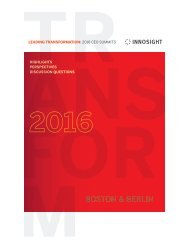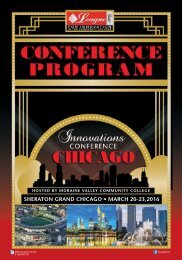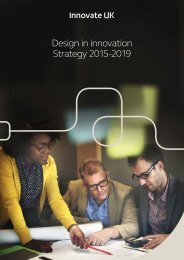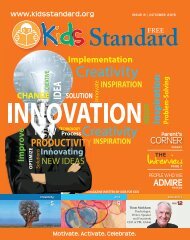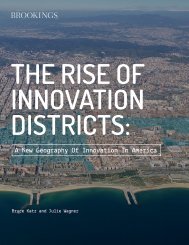TECHNOLOGY AT WORK
1Oclobi
1Oclobi
Create successful ePaper yourself
Turn your PDF publications into a flip-book with our unique Google optimized e-Paper software.
February 2015<br />
Citi GPS: Global Perspectives & Solutions<br />
39<br />
As automation increases in the biological<br />
sample storage market, the size of the<br />
market is also expected to increase<br />
Robert Garlick<br />
Global Product Head<br />
James Ainley<br />
European Hotels & Leisure Analyst<br />
The Hotel and Entertainment industries are<br />
using automation for customer convenience<br />
as well as headcount reduction<br />
The current market for biologic sample storage is $500 million (33% is automated),<br />
with that number estimated to be $1 billion by 2018 (estimated 40% automated).<br />
Brooks currently competes in the -20 to -80 degree Celsius market with machines<br />
that can house 1 million samples and there are only 3 competitors and 200<br />
customers. Brooks is currently developing -150 degree Celsius automation<br />
machines that could house fewer samples, but would attract 15,000 customers. The<br />
-150 degree units requires significant R&D and enhanced technology to ensure that<br />
the robotics do not freeze (which occurs at -8 degrees Celsius). Currently, the -150<br />
degree market is 100% manual and Brooks is expected to have robotic prototypes<br />
available for delivery in 2015 with revenue generation starting in 2016.<br />
Robots can also be used to assist patients and the elderly in their own homes,<br />
thereby limiting the amount of home healthcare that is required and shortening<br />
hospital stays as patients can be monitored remotely. From carrying elderly patients<br />
to a bed, a bath or a wheelchair and assisting in food preparation, to lifting food and<br />
feeding patients and monitoring vital signs, robots are increasingly being used in the<br />
home setting. Examples of devices include 1) Riba by Riken, which can carry<br />
elderly patients to a bed, a bath or a wheelchair; 2) Twenty One, which helps<br />
disabled people out of bed and helps prepare meals; 3) Secom’s My Spoon, which<br />
can lift food to a patients mouth; and 4) Para, which is a therapeutic robot pet<br />
shaped as a baby harp seal that is designed to be a companion to the elderly and<br />
responds to touch, stroke, light and sound.<br />
Robots and Automation in Consumer Markets<br />
The last decade has seen the automation of grocery shop check-outs increase and<br />
now automation is extending into restaurants. The National Restaurant Association<br />
(NRA) suggests there are 13.1 million fast food workers in the US alone. In<br />
December 2013 casual dining restaurant chain Applebee's announced that they<br />
would have tablets installed at every table by the end of 2014, allowing customers<br />
to order and pay the bill at their tables. In October 2014, McDonalds then CEO<br />
Donald Thompson told the Wall Street Journal he plans to "make it easier for<br />
customers to order and pay for food digitally and give people the ability to customise<br />
their orders." McDonalds has started to install touch screens in Europe, eliminating<br />
the need for workers to take a customer’s order. A robot manufactured by<br />
Momentum Machines can assemble a burger with all the condiments in 10 seconds<br />
(i.e. 360 hamburgers an hour) and the company says the device could save fast<br />
food outlets $135,000 a year in labour costs according to Digital Trends. This also<br />
helps reduce employee turnover issues. In China a new fast food robot called "Chef<br />
Cui" slices noodles and costs ¥30,000 to buy ($2,000) vs. $4,700 per year for a<br />
human noodle chef, according to Associated Press.<br />
Some hotel companies are rolling out mobile check-in and room key access to save<br />
on reception staff and improve customer convenience. Marriott is rolling this out to<br />
4,000 hotels starting in 2014. Merlin Entertainment is rolling out virtual queuing in its<br />
theme parks to improve customer satisfaction and free up customers to spend<br />
money elsewhere in the parks. Virtual queuing allows you to effectively book your<br />
slot on a ride using an electronic device or a mobile app. In the meantime, the<br />
customer can grab a coffee or go on another ride rather than standing in the queue.<br />
Ticket clerks have also been automated at many cinemas and parking lots. In the<br />
travel industry, agents have been replaced by digital travel agents such as Kayak.<br />
And when travelling abroad many individuals now use automated gates at passport<br />
control.<br />
© 2015 Citigroup



